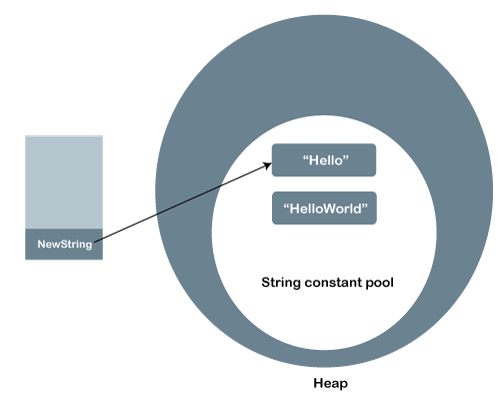Why Are Strings Immutable in Java? Best Practices and Usage Instances
Wiki Article
Unalterable Strings: A Key Element in Ensuring Information Uniformity and Integrity
In the realm of information administration, the importance of immutable strings can not be overemphasized. These imperishable series of personalities play a pivotal function in supporting the integrity and precision of information within systems. By preserving a state of immutability, data uniformity is ensured, promoting a structure of dependability whereupon critical processes count. The principle of immutable strings goes beyond simple technicality; it is a linchpin in the complicated internet of information governance. As we check out the benefits, application methods, and sensible applications of unalterable strings, a clearer picture arises of their crucial nature in protecting the digital landscape.The Concept of Immutable Strings
Immutable strings, a basic principle in programs, describe strings that can not be changed when they are created. Basically, as soon as a string worth is appointed, any procedure that shows up to change the string in fact creates a brand-new string. This immutability makes certain data uniformity and dependability in applications, as it stops unexpected modifications to the original information.
Benefits in Information Consistency

Information uniformity is crucial in numerous facets of software program growth, including database monitoring, multi-threaded atmospheres, and distributed systems (Why are strings immutable in Java?). Unalterable strings contribute significantly to accomplishing this consistency by stopping data corruption due to concurrent access. In circumstances where multiple processes or strings connect with the same data at the same time, immutable strings act as a safeguard against race problems and synchronization problems
In addition, the immutability of strings streamlines debugging and screening processes. With unalterable strings, programmers can rely on that when a string is set, it will stay unchanged, making it much easier to map the resource of mistakes and making sure that test instances create constant outcomes. This integrity in information handling inevitably leads to a lot more durable and steady applications.
Applying Immutable Strings
Making certain the immutability of strings requires a thoughtful approach to their application in software application development. One key strategy is to make string courses in a means that stops alterations when a string things is developed. By making strings immutable, designers can improve data uniformity and dependability in their applications.To apply immutable strings efficiently, designers should favor producing brand-new string objects instead of changing existing ones. This technique makes sure that as soon as a string is appointed a worth, it can not be transformed. Furthermore, any kind of operation that appears to change the string must create a new string with the wanted changes rather than altering the initial.
Furthermore, utilizing unalterable strings can streamline concurrency management in multi-threaded settings. Considering that unalterable strings can not be transformed after development, they can be securely shared among numerous threads without the danger of data corruption.
Function in Dependability Assurance
In software application development, the use of immutable strings plays an important function in guaranteeing the integrity of data procedures. Immutable strings, once created, can not be modified, making sure that the data they represent stays constant throughout the application's implementation. This immutability property provides a degree of assurance that the data being processed will certainly not be unintentionally altered, causing unanticipated results or errors in the system.By incorporating unalterable strings right into software program style, developers can enhance the integrity of their applications by lessening the threats associated with mutable data - Why are strings immutable in Java?. Immutable strings help in stopping data corruption or unplanned adjustments, which can be especially important when dealing with delicate information or when data integrity is extremely important
Moreover, making use of immutable strings simplifies concurrent handling, as multiple threads can securely access and share string information without the threat of one thread changing the material while an additional is reviewing it. This aspect adds dramatically to the general reliability of the software system, making certain foreseeable and regular behavior in information managing operations.
Applications and System Integration
The seamless assimilation of unalterable strings into different applications and systems is pivotal for guaranteeing durable information consistency and integrity across diverse technical atmospheres - Why are strings immutable in Java?. Unalterable strings play an important role in enhancing the stability of information exchanges and imp source communications within complex software application ecological communities. By incorporating immutable strings right into applications, developers can alleviate the dangers connected with information meddling, unapproved adjustments, and unintended modifications, therefore fortifying the total security stance of the systemIn the context of system assimilation, immutable strings serve as a fundamental aspect for establishing safe interaction channels and promoting seamless data transfers between various parts. Their immutable nature guarantees that information sent between systems remains verifiable and the same, decreasing find here the probability of inconsistencies or mistakes that might jeopardize the honesty of the entire system. In addition, immutable strings can enhance interoperability between inconsonant systems by giving a standardized format for data depiction, making it possible for extra reliable data processing and exchange procedures across interconnected systems. By embracing immutable strings in applications and system combination processes, companies can strengthen their information facilities and support the integrity and uniformity of their details assets.
Conclusion
In verdict, unalterable strings play an essential function in keeping information consistency and reliability in different applications and system integrations. By making certain that strings can not be transformed when developed, the stability of data is preserved, reducing the risk of mistakes and variances. Executing unalterable strings can substantially boost the reliability of systems, inevitably resulting in even more accurate and trustworthy data processing.
Report this wiki page